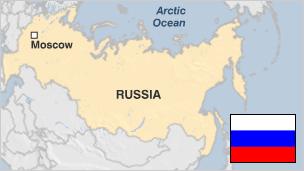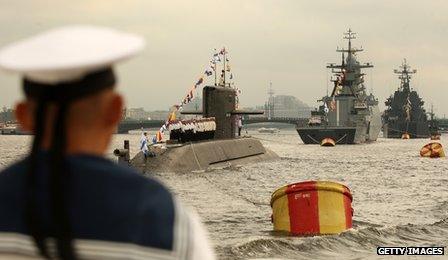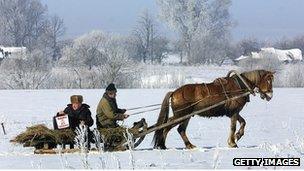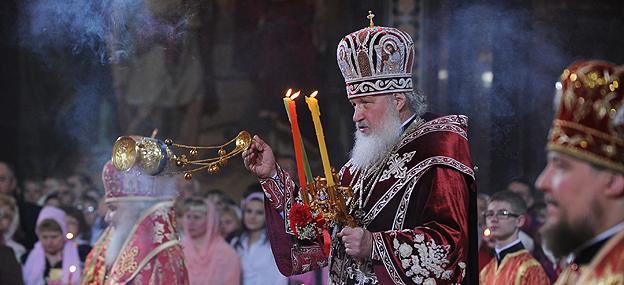Russia profile - Overview
- Published

Russia - the largest country on earth in terms of surface area - emerged from a decade of post-Soviet economic and political turmoil to seek to reassert itself as a world power.
Income from vast natural resources, above all oil and gas, helped Russia overcome the economic collapse of 1998, but the oil price slump of 2014 ended the long run of prosperity. The state-run gas monopoly Gazprom still supplies a large share of Europe's needs.
Vladimir Putin - Russia's dominant political figure since 2000 - has enhanced his control over state institutions and the media - a process supplemented more recently by an emphasis on fierce nationalism and hostility to the West.

Russia is one of the world's major military powers
A period of rapid privatisation under the rule of President Boris Yeltsin in the early 1990s created a powerful group of magnates - known as "oligarchs" - with vast energy, media and other business interests, in a sharp contrast to widespread economic hardship among ordinary Russians.
Yeltsin's handpicked successor, former KGB officer Vladimir Putin, quickly moved to break the oligarchs' influence, and a close-knit circle of his associates has since - directly or indirectly - to a large extent replaced them in their control of key economic assets.
Russia resurgent
Backed by a booming economy, Russia in the 2000s adopted a more assertive foreign policy stance, and began to promote its perceived interests in former Soviet states more openly, even at the cost of antagonising the West.
The resulting tensions first became acute in August 2008, when a protracted row over two breakaway regions of Georgia escalated into a military conflict between Russia and Georgia.
Further diplomatic friction followed over US missile defence plans in Eastern Europe - since shelved - and Moscow's role in Iran's nuclear energy programme.
A "reset" of Russia-US ties early in 2010 resulted in a new nuclear arms treaty to replace the expired 1991 Strategic Arms Reduction Treaty (Start), but fell foul of Kremlin anger at US criticism of its treatment of opposition activists.
The Ukrainian revolution of February 2014, which ousted Russian ally President Viktor Yanukovych and ushered in a Western-leaning leadership, triggered an even more serious crisis in East-West relations, especially after Russia responded by annexing Crimea.
After Moscow fomented rebellions in eastern Ukraine, the US, EU and other Western states imposed sanctions against businesses and individuals close to President Putin.
Add to this Syria's increasing military support for the Assad government in Syria's civil war, and some begin to fear the start of a protracted stand-off between West and Russia - and even a new Cold War.
Economic muscle
Russia's recent economic power has lain in its key natural resources - oil and gas.
The energy giant Gazprom is close to the Russian state, and the government uses it to bolster its influence abroad.

Traditional forms of transport are still being used in rural areas
Moscow has more than once reminded the rest of the world of the power it wields as a major energy supplier, most recently in the Ukraine conflict in 2014.
A long economic boom based on high oil and gas prices started to end in 2013, when Russia's economic prospects began to worsen.
This was exacerbated by a sharp fall in world oil prices and the imposition of Western sanctions over Ukraine the following year.
The economy is heavily dependent on raw material exports, and President Putin has been reluctant to encourage diversification for fear of imperilling government control over it.
Ethnic and religious divisions
While Russians make up more than 80% of the population and Orthodox Christianity is the main religion, there are many other ethnic and religious groups. Muslims are concentrated among the Volga Tatars and the Bashkirs and in the North Caucasus.
Separatists and latterly armed Islamists have made the Caucasus region of Chechnya a war zone for much of the post-Soviet era.
Many thousands have died since Moscow - fearful of its control of the wider North Caucasus - sent in troops to put down a separatist rebellion in Chechnya in 1994, and again five years later.
With a pro-Kremlin now firmly in charge in Chechnya, Russian has since declared the insurgency effectively finished, although sporadic violence continues.

Orthodox Christianity is the dominant faith in Russia, which has a variety of religions